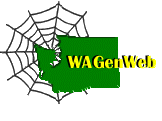Pioneer life in the Benton Co. WA area
Mothers Were Doctors Too/Vinegar Sniffed For Nosebleed
By BURTON 0. LUM
Tri-City Pioneer
Tri-City Herald, Sunday, 29 October 1961
The Tri-City region in the early 1880s was without a doctor, surgeon or dentist. The mother of each family took care of her children’s health. They had their home remedies for the different ailments. Earache was treated by dropping warm sweet oil in the ear and placing a cloth bag filled with hot ashes on the outer ear. For nosebleeds, vinegar was snuffed up the nostrils. Toothache was treated by washing the teeth with strong salt water, then placing a hot compact near the sore tooth and gum. For a cold in the head and throat the children gargled with vinegar or salt water. If the cold persisted and the throat became soarer, sliced fat bacon well peppered was sewed on a woolen cloth. This was placed around the throat and neck as a bandage with the bacon side against the skin. The mothers watched the outer skin of the neck to see that it did not blister. When the soreness was drawn out of the throat, the mothers took the bacon from the cloth and gradually reduced the bandage by tearing off the strip each morning from its tip until it was gone. A strong salt water gargle with an occasional tablespoon full of honey treated a throat cough.
The pioneer mothers’ most dreaded child’s ailment was croup. Different treatments for this disease were given by the pioneer mothers. The one generally given was to place a steaming tea kettle in the old wooden wash tub, place a woolen blanket over the top of the tub to trap the steam. They would then hold the child in the tub where it would inhale the steam. The blanket was raised and lowered over the top of the tub forming a steam cabinet. The child’s chest was rubbed with goose grease. A clean flour sack was wrapped around the child and he was rolled in a hot blanket and placed in a warm bed free from drafts.
One of the pioneer mothers’ favorite remedies was caster oil. They gave it as a preliminary treatment for most ailments. The children detested its taste.
For dysentery or summer complaint, the pioneer mothers dug the wild tansy that grew everywhere as a weed in the Tri-City area. They steeped its roots in water and gave the children tansy tea.
Hives or prickly heat was treated with a soda water sponge bath. Milk and honey was taken internally.
Infection or blood poison caused by stepping on a rusty nail or an inflamed blister was treated by soaking the wound in Epsom salt brine.
For pneumonia, or lung fever as the pioneers called it, the patient was given a very hot bath in the old wooden wash tub. He was then placed in bed under hot woolen blankets and given three or four large drinks of hot sling made of gin and New Orleans molasses which forced perspiration.
The pioneer women used onion poultices and mustard plasters for various ailments. They placed the whites of eggs in the mustard plasters to keep them from blistering. Tea made from watermelon seeds was given to regulate the kidneys.
The pioneer mothers gave their children, every spring, a course of sulphur and molasses. This was supposed to benefit their children’s blood.
Practically all the pioneer mothers of the Tri-City region breast fed their babies.
There were but three recorded deaths of children in the entire Tri-City area during a period of five years. These children were buried in a little graveyard located on a high sandy knoll situated about quarter a mile upstream from the Kennewick portal of the old Kennewick NPRR bridge. The first child to die was five year old Charlie Gray, the son of steamboat Captain Al Gray. The second child was an infant of Mr. and Mrs. Charlie Aune. The third was Clarence Martin, a twelve year old son of Mr. and Mrs. William Martin. All three were buried at this site. This graveyard was above the high water of the Columbia in 1894. Tri-City pioneer mothers took good care of their children. The records show that no child lost its life through accident due to the mother’s carelessness. None died of hunger or exposure. None strayed from home and was lost. This pioneer country, beset on every side with scarcity and hardships, had an abundance of the greatest thing in the world, Mother Love.
Return to Index of Burton Lum Articles

